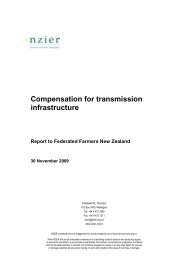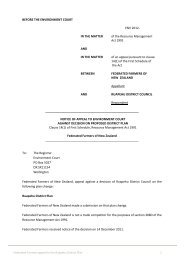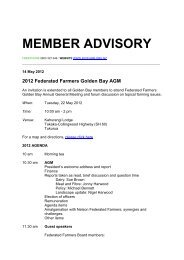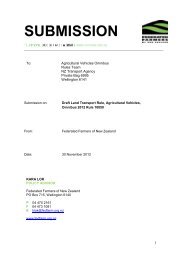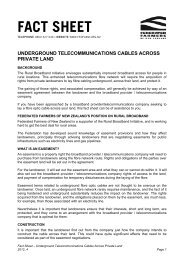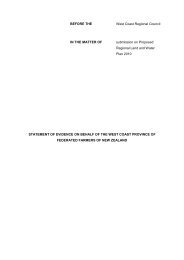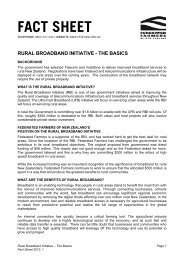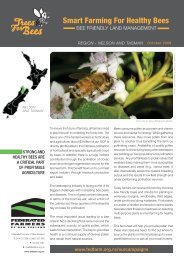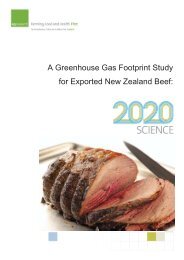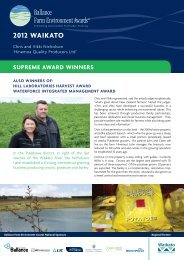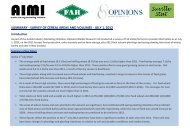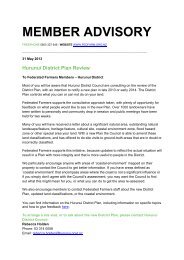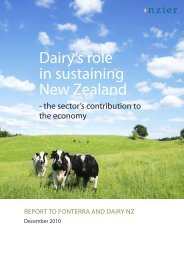here - Hill Laboratories
here - Hill Laboratories
here - Hill Laboratories
You also want an ePaper? Increase the reach of your titles
YUMPU automatically turns print PDFs into web optimized ePapers that Google loves.
2013 OTAGO<br />
Mitchell Webster Group<br />
Jock Webster, Nick Webster, and Peter Mitchell<br />
SUPREME AWARD WINNERS<br />
ALSO WINNERS OF:<br />
HILL LABORATORIES HARVEST AWARD<br />
MASSEY UNIVERSITY DISCOVERY AWARD<br />
BALLANCE AGRI-NUTRIENTS: NUTRIENT MANAGEMENT AWARD<br />
This intensive cropping operation and wholesale<br />
business producing bird and small animal feed is<br />
based on the Mitchell family’s historic ‘Rosedale’<br />
farm at Weston, but covers 1380ha of arable land<br />
in North Otago.<br />
Ballance Farm Environment Awards National Sponsors<br />
It is, according to the award judges, “a credit to the Mitchell<br />
and Webster families, an extraordinary and inspirational family<br />
business that has withstood the test of time”.<br />
The formal business association between the two families<br />
began in 1972. Peter Mitchell’s father Ross, who retired from the<br />
business 18 months ago, suggested to Nick Webster’s father Jock<br />
that they join forces. Ross was farming with his brother Bruce<br />
on Rosedale, the land their family had settled in 1871. Jock had<br />
decided he preferred farming to being a scientist for Crop &<br />
Food Research. As a schoolboy Jock had worked on the Mitchell<br />
property and t<strong>here</strong> was another connection to come – Ross<br />
married Jock’s older sister Ainslie.<br />
“They knew each other pretty well and had identified each<br />
other’s skill sets,” explains Nick, “they saw they could do better<br />
together than as individuals.” The partnership flew in the face of<br />
doubters and the collaborative approach has imprinted on the<br />
next generation, with their sons Peter and Nick now integral to<br />
what is a solid and diverse operation.<br />
The group is made up of two businesses. The birdseed and small<br />
animal feed business is Topflite Ltd. Mitchell & Webster Ltd is<br />
the growing arm, specialising in the production of sunflower<br />
Regional Partners
•<br />
Exceptional<br />
•<br />
Remarkable<br />
•<br />
Long-term<br />
Very<br />
Mitchell Webster Group<br />
Jock Webster, Nick Webster, and Peter Mitchell<br />
SUPREME AWARD WINNERS (continued)<br />
JUDGES’ COMMENTS<br />
and canary seed but also<br />
growing feed wheat, barley,<br />
ryegrass, hybrid rape,<br />
potatoes, and, to meet the<br />
market for the growing dairy<br />
industry in the area, lucerne,<br />
grass and maize for silage and<br />
fodder beet for grazing.<br />
The group owns about 700ha<br />
between Weston and Totara<br />
and currently either leases<br />
or sharefarms 680ha. 600ha<br />
of their own land and 50ha<br />
of leased land is irrigated.<br />
Contour is mainly rolling<br />
downlands. T<strong>here</strong> are 18 fulltime<br />
employees but at busy<br />
times up to 40 people can be<br />
on the payroll.<br />
Jock, Peter and Nick are directors of both companies and t<strong>here</strong><br />
is an independent advisor involved on each board. Topflite’s<br />
advisor has marketing and retail experience and Mitchell<br />
& Webster’s is a farm consultant. The judges commented:<br />
“Remarkable in-business practice, clear lines of communication<br />
and demarcation of roles through the development of a formal<br />
business structure, maintaining a strong business partnership<br />
between the two families.”<br />
Jock oversees Topflite, a company that grew out of drought<br />
and high interest rates in the 1980s. Casting around for<br />
diversification to firm up their income, Jock and Ross began by<br />
growing sunflowers for their seeds. They then formed Topflite<br />
and the company now sells around 1600 tonnes of birdseed<br />
mixes and associated products annually in Australasia. They use<br />
all the canary and sunflower seed they grow and also buy in<br />
other raw material to make products.<br />
Nick and Peter work together running the farming company. Just<br />
as their fathers did before them, they share the load effectively.<br />
“We know each others strengths and weaknesses and try to work<br />
to them,” says Nick. “Pete is great with detail and technology so<br />
he takes care of the agronomy and financing and I enjoy people<br />
so my focus is the staff and our outside relationships.”<br />
The judges were impressed with the sustainable cropping<br />
regime, noting some areas had been cropped since 1968. This<br />
was achieved through monitoring and recording of inputs and<br />
outputs and careful management of water and soil resource,<br />
they said.<br />
The two families place great importance on community and<br />
industry contribution, and family time. They are all involved in a<br />
wide range of school, sporting and industry groups.<br />
Jock was a leading force in the establishment of the North<br />
Otago Irrigation Company (NOIC) Scheme which, when it was<br />
established in 2006, changed the security of farming in the<br />
drought-prone Waiareka Valley forever.<br />
Peter has developed close links with the Foundation for Arable<br />
Research through contributing to crop trials and taking advantage<br />
of their research. He has been elected to the FAR board.<br />
Jock’s wife is Helen, they have three adult children, Nick, Greg<br />
and Jane. Nick and his wife Kate have two daughters, Grace (3)<br />
and Georgia (2). Peter and his wife Sandra have two sons, Henry<br />
(18) and William (16).<br />
management of a large-scale operation; leaders in industry diversification through creation of ‘Topflite’ business.<br />
in-business practice; clear communication and demarcation of roles and responsibilities; recognition of strengths.<br />
sustainability focus through research and crop trials; wise rotations and agri-chemical use; comprehensive monitoring.<br />
strong community involvement; insistence around family time; strong business partnership between two families.
•<br />
Profitable,<br />
•<br />
Emphasis<br />
•<br />
Excellent<br />
Practical<br />
Terry and Jacqui Carr (Equity Managers)<br />
Argyll Dairy Farm Partnership<br />
LIC DAIRY FARM AWARD<br />
MERIDIAN ENERGY EXCELLENCE AWARD<br />
The Carrs, who drive this 1150 cow South Otago<br />
dairy business, are “a true partnership” according<br />
to the award judges.<br />
The couple complemented each other, said the judges, who listed<br />
a highlight as “the passion demonstrated by Terry for technology<br />
and energy efficiency and Jacqui in staff management, health<br />
and safety, recording and maintenance”.<br />
The judges commended Terry and Jacqui’s management and<br />
“exceptional” business planning. They wrote: “Your drive and<br />
determination to succeed was evident and has resulted in a top<br />
performing, profitable business.”<br />
The property is 362ha (332ha effective) at Clydevale, north west<br />
of Balclutha and in its fifth season since conversion from a sheep<br />
and deer fattening unit. T<strong>here</strong> are two 54-bale rotary cowsheds.<br />
Production last season was 1407 kgs/MS per effective hectare.<br />
Terry and Jacqui work with the contract milkers Chris and<br />
Sandra Campbell who are in their second season on the<br />
JUDGES’ COMMENTS<br />
place. For the past three years Terry has also been a senior<br />
supervisor for the MyFarm dairy syndicate. The judges noted,<br />
“an exceptional relationship between the contract milkers and<br />
owners” and considered, “Terry’s role with MyFarm gives him a<br />
unique perspective enabling benchmarking to further improve<br />
productivity”.<br />
The judges noted the focus on optimising cow performance<br />
with careful attention to details ranging from pasture cover<br />
and quality monitoring to lane design minimising time walking<br />
between sheds and grazing.<br />
The Clutha River runs along 4.5kms of the farm boundary. The<br />
river is, says Terry, “both an asset and a risk”. Their land contains<br />
a designated flood zone meaning in the event of a flood it<br />
has to go under water to prevent Balclutha doing so. This also<br />
means t<strong>here</strong> can be no further flood protection earthworks<br />
undertaken for the farm without consent, so planning for the<br />
conversion was critical.<br />
The judges were impressed that the development of fencing<br />
and other infrastructure enabled stock to be moved and well<br />
fed during a flood event. In addition the fencing has provided<br />
“optimum flexibility for future grazing, cropping and irrigation<br />
while making every effort to retain existing amenity planting”.<br />
The Argyll partnership is future proofed from many angles<br />
and structured for succession through flexible systems. The<br />
two milking sheds and fencing placement means the property<br />
could be smoothly split should an investor need to release their<br />
capital. These considerations are especially important, the Carrs<br />
believe, when working with multiple business partners.<br />
Terry and Jacqui have three adult children Brook, Ashlee and<br />
Laura.<br />
productive large scale dairy farm; clear objective to be in top five percent of industry; focus on long-term profitability.<br />
on monitoring and recording, effectively driving results; careful farm and shed design to improve efficiencies.<br />
staff management, support, training and communication; commendable commitment to community and industry groups.<br />
choices to farm for the long term; addition of second shed, contingency planning around five year projected income.
•<br />
High<br />
•<br />
In<strong>here</strong>nt<br />
•<br />
Careful<br />
Excellent<br />
Alistair and Duncan Campbell and families<br />
Earnscleugh Station Ltd<br />
BEEF + LAMB NEW ZEALAND LIVESTOCK AWARD<br />
OTAGO REGIONAL COUNCIL SUSTAINABLE RESOURCE MANAGEMENT AWARD<br />
ALLIANCE QUALITY LIVESTOCK AWARD<br />
The Campbells clearly have a deep understanding<br />
of their environment and an absolute commitment<br />
to long-term sustainability on their 21,000ha<br />
Central Otago property.<br />
Whilst describing Earnscleugh as a “brittle environment”, the<br />
award judges praised this father and son working partnership<br />
“that works very well”. The judges wrote: “Your determination<br />
to succeed, hard work and ability to manage a sustainable<br />
business in such a harsh environment is commendable. Your<br />
passion and enthusiasm for your stock is evident and has been<br />
realised through an exceptionally successful and well-recognised<br />
stud stock enterprise.”<br />
Alistair and Duncan share a passion for breeding; they have beef<br />
cattle and merino sheep studs. “We’re not really machinery<br />
minded, we just love stock,” says Alistair. Duncan manages the<br />
property now but father and son share the stud work. “It’s<br />
JUDGES’ COMMENTS<br />
fantastic to have someone else who knows the individual stock,”<br />
says Alistair, “we can talk for hours!”<br />
Through Earnscleugh Station Lands Ltd, Alistair and Judith, with<br />
Duncan and their daughter Jessica (a Dunedin accountant), farm<br />
26,000su on the property. The rolling to steep contoured station<br />
begins near the western banks of the Clutha River at Alexandra<br />
and runs over the Old Man Range as far as the Otago Southland<br />
region boundary. Altitude is 167m to 1706m ASL. Rainfall at the<br />
station’s iconic brick homestead averages just over 300mm<br />
annually, though this figure is around 762mm at mid altitude and<br />
up to 1778mm in the tops.<br />
Duncan came home to the farm 10 years ago with an agricultural<br />
science degree, stud work in Australia and overseas travel to his<br />
credit. Alistair and Judith purchased Earnscleugh in 1981 with the<br />
support of several urban business partners who they eventually<br />
bought out in 2003. Alistair says he chose the property because<br />
it was, at that time, “the best sweet warm merino country I<br />
could get”.<br />
However, the rabbits also liked Earnscleugh. Comments<br />
Alistair wryly, “unfortunately the best merino places are also<br />
the best rabbit places.” Between the mid 1980s and mid 1990s<br />
Earnscleugh’s future hung in the balance. The station went<br />
from carrying 22,000su down to 13,000su. At mid altitude the<br />
rabbits were “a seething mass” recalls Alistair. “It was a terrible,<br />
frightening time.”<br />
They joined forces with the Government and regional council<br />
to wage war on the rabbits. “I could see we were either going to<br />
go broke, or get rid of the rabbits. Without the influence of the<br />
business partners the bank may well have sold us up.”<br />
performing livestock operation with clear objectives for stock to be in top 10 percent of their class.<br />
understanding of land use capabilities of the property; development of a grazing system well within environmental limitations.<br />
management of biodiversity and vegetation cover through exceptional monitoring and recording to suit stock type/environment.<br />
monitoring, recording and benchmarking of animal health; efficient nutrient management.
•<br />
Extraordinary<br />
•<br />
Adaptation<br />
•<br />
Long<br />
Excellent<br />
Alistair and Duncan Campbell and families<br />
Earnscleugh Station Ltd<br />
BEEF + LAMB NEW ZEALAND LIVESTOCK AWARD<br />
OTAGO REGIONAL COUNCIL SUSTAINABLE RESOURCE MANAGEMENT AWARD<br />
ALLIANCE QUALITY LIVESTOCK AWARD<br />
JUDGES’ COMMENTS<br />
Then Alistair put two full-time<br />
rabbiters on the payroll; Maurice<br />
Williamson and Kevin Boyle.<br />
Slowly their efforts, combined<br />
with ongoing specialised grazing<br />
management, turned the tide<br />
against the rabbits.<br />
Maurice and Kevin have since<br />
retired but the station still<br />
employs one full-time rabbiter,<br />
Bill Linwood. “We owe the<br />
fact that we are still <strong>here</strong> to the<br />
work of those rabbiters,” Alistair<br />
candidly. “Now, every single<br />
management decision on this<br />
property puts rabbits first.”<br />
The judges commented: “Have managed to keep cover on low<br />
altitude country even during droughts, this deters rabbits and<br />
protects the soil. Outstanding rabbit control in one of the<br />
most challenging environments in Otago. Have transformed<br />
the property and continue to understand the importance of<br />
maintaining rabbits at low numbers.”<br />
The Campbells have three cattle studs. Alistair and Judith<br />
brought their Hereford stud when they came to Earnscleugh.<br />
They began the Angus stud in 1998 and Composite the following<br />
year. About 100 bulls are sold each year.<br />
The Earnscleugh merino stud is, as Alistair explains it, “actually<br />
seven studs within one”. They currently have 2500 stud ewes<br />
ranging from ultrafine to strong polls, carrying fertility and<br />
muscle genes.<br />
Alistair calls himself “a risk taker” and says he aims to pre-empt<br />
what the market will be wanting in 10 years. “T<strong>here</strong>’s no use<br />
breeding what is popular at the time because that’s not giving<br />
yourself long enough to produce quality. When you get the<br />
market anticipation right, you can do very well,” he says. He<br />
points out the market advantage in the fact they were identifying<br />
ultrafine sheep as early as 1981, and as far as he knows, this wasn’t<br />
done in Australia until the mid 1990s.<br />
Noted the judges: “The stud operation is an integral and high<br />
performing part of the business, both financially and physically.<br />
Outstanding management of a vast property, running often<br />
complex groups of stock through excellent monitoring systems<br />
and constant review against benchmarks, both internal and<br />
external to the property.”<br />
Six weeks of spring growth is crucial to farming a property like<br />
Earnscleugh. “We could survive on six inches (152mm) of a rain<br />
a year if it came every spring,” says Alistair. It is a testimony to<br />
farming experience and perseverance that in the past 10 years<br />
they survived an eight-year period with little or no spring rain.<br />
“That drought broke 18 months ago, fortunately,” says Alistair.<br />
“It was pretty tough, first we had to send stock away because of<br />
the rabbits, then because of the spring drought.”<br />
The judges described the Campbells’ knowledge of differing<br />
land use capabilities as “exceptional”. They wrote: “Impressive<br />
integration of stock class and type, optimising soil and climate<br />
limitations throughout the year. Focus on long term sustainability<br />
– extremely profitable low cost operation demonstrated by the<br />
continued ability to profit despite eight years of dry springs.”<br />
Duncan and his wife Amanda have two children, Blake (1) and<br />
baby Holly.<br />
dedication and resolve regarding rabbit control; forethought to future irrigation management.<br />
to meet market requirements; wise use of technology to improve performance and advance genetics.<br />
term financial sustainability; prudent use of benchmarking to improve performance, off-farm investments, succession planning.<br />
relationships with employees, high staff retention and a strong commitment to community and industry groups.
•<br />
Progressive<br />
•<br />
Pride<br />
•<br />
Incredible<br />
Wise<br />
Stuart and Lorraine Duncan, Graeme and Alison Duncan<br />
Penvose Farms<br />
PGG WRIGHTSON LAND AND LIFE AWARD<br />
WATERFORCE INTEGRATED MANAGEMENT AWARD<br />
JUDGES’ COMMENTS<br />
The Duncans are<br />
clearly relishing the<br />
diverse format of their<br />
agri-business that<br />
encompasses tourism,<br />
crossbred and halfbred<br />
sheep, deer, an Angus<br />
cattle stud and equity<br />
partnership dairying in<br />
Central Otago.<br />
The award judges praised the Duncans’ approach, describing<br />
their business as “a progressive family farming operation”. They<br />
wrote: “Your passion and enthusiasm for a very profitable and<br />
productive business was evident. The judges were particularly<br />
impressed with the diversity of the business and your ability to<br />
manage this effortlessly.”<br />
This is a forward-thinking, refreshingly optimistic family. “You<br />
don’t drive down the road looking backwards do you,” quips<br />
Stuart with the time-honoured dry rural wit enjoyed by the<br />
many visitors to their 1900ha farm and associated Rail Trail and<br />
tourist accommodation.<br />
However, the Duncans do look backwards, to honour their family<br />
history. Stuart is proud fourth generation on the original block<br />
at Wedderburn that was taken up by Duncans in 1894. Stuart’s<br />
great-grandfather David and his two brothers split three ways,<br />
with only David’s block staying in long-term family ownership.<br />
Stuart and Graeme are proud that on their watch they have<br />
purchased land to put that original Duncan brothers’ block<br />
back together, and added two more properties. In addition a<br />
‘Daughters Trust’ with a range of assets is in place for Stuart’s<br />
three sisters, as part of succession.<br />
Their Wedderburn Cottages is the largest accommodation<br />
business on the Rail Trail. They are equity partners in an 1150<br />
cow Maniototo dairy farm, with an ownership grouping Stuart<br />
and Lorraine instigated. On Penvose Farms they winter around<br />
12,600su. The mix in recent years has been a nod to favouring<br />
halfbred hoggets for rewarding Smartwool contracts and<br />
includes 6400 ewes, 3800 hoggets, 400 cattle and 450 hinds<br />
plus their weaners. Height on the farm ranges between 550m<br />
ASL and 1000m ASL. Rainfall averages 533mm annually but the<br />
construction of a dam, covering 12ha, and the use of centre<br />
pivot irrigation mitigates the dry climate.<br />
The western boundary of Penvose Farms reaches up Rough<br />
Ridge. Contour is Central Otago hill country. The judges noted:<br />
“Low intensity management is helping preserve the values of<br />
the upland tussock block. T<strong>here</strong> is good eastern falcon breeding<br />
habitat and coral broom habitat in this area.” T<strong>here</strong> are two blocks<br />
of tussock (340ha and 370ha) on good easy rolling country. Says<br />
Stuart, “it sits t<strong>here</strong> like a nature park.”<br />
Stuart credits the excellent working relationship of Lorraine and<br />
his parents for the success of their tourism arm. They are actively<br />
involved with the hospitality offered daily, and gradually the<br />
youngest Duncans are also. Ellie is 12, Mitchell (10) and Todd (8).<br />
“For the first time in about 10 years the wool income passed the<br />
tourism income last season,” says Stuart. “We are very aware<br />
the two are connected; tourism is not going away, but the farm<br />
attracts the tourism.”<br />
farming family operation performing in top 10 percent of land class; dedicated to long term stewardship.<br />
and passion for the area, land and history; responsible management protecting biodiversity and heritage.<br />
foresight in early development of water storage, district leaders in adopting efficient water use technology.<br />
use of business diversity; strategic use of capital and off farm investments; outstanding return on capital.
•<br />
Sustainable<br />
•<br />
A<br />
•<br />
Intergenerational<br />
A<br />
Tom and Jan Pinckney<br />
Northburn Station<br />
DONAGHYS FARM STEWARDSHIP AWARD<br />
In the heart of Central Otago, overlooking Lake<br />
Dunstan just north of Cromwell, the Pinckneys<br />
run a traditional high country merino operation<br />
with some significant added extras.<br />
In addition to 10,000su of merino sheep and beef cattle, Tom<br />
and Jan have established a biodynamic vineyard, which has just<br />
gained BioGro organic certification. They also grow organic fruit<br />
and vegetables and have established a function venue and wine<br />
and farmgate shop known as ‘The Shed’.<br />
After a visit to the property the award judges wrote: “Your<br />
passion for the property and its history was evident, and the<br />
way you are showcasing this to the public through The Shed<br />
is commendable. The judges noted that you, in combination<br />
with great staff, are moving the property toward a more<br />
sustainable future whilst providing exceptional stewardship of<br />
the biodiversity that it has.”<br />
Northburn is an 8500ha freehold property purchased by the<br />
Pinckney family in 1993. In 2006, as part of a succession plan,<br />
JUDGES’ COMMENTS<br />
Tom and Jan began farming it in their own right, but they were<br />
already firmly established on the place. Between 1999 and 2001<br />
they planted 23ha of grapes; in 2001 they took up the leases for<br />
adjoining properties ‘Waenga’ and ‘Leaning Rock’, bringing their<br />
holding to 13,000ha. The Shed was opened at the end of 2008.<br />
Jan was a Queenstown restaurateur when the couple met, so,<br />
explains Tom, “it was logical to utilise her considerable skills”.<br />
The couple have a daughter Olivia (13) and two sons Nic (12) and<br />
Sam (9).<br />
The altitude on the Pinckney land ranges from 200m to 1647m<br />
ASL. Northburn’s annual average rainfall is just over 300mm; Tom<br />
says NIWA has officially pronounced it “the driest place in New<br />
Zealand”. They did run 13,000su but about five years ago made a<br />
deliberate decision to drop 3000su. “I did the financial analysis<br />
and talked to wise locals,” says Tom. “I realised the right thing to<br />
do was the traditional Central Otago way of a low stocking rate<br />
for higher per head performance.”<br />
Tony Holder is the farm manager. In The Shed and Northburn’s<br />
vineyard/winery t<strong>here</strong> are seven full time and 10 part time staff.<br />
Casuals are employed seasonally over all three arms of the<br />
business. The judges noted that the Pinckneys “recognise the<br />
value tourism activity provides for the wider community as well<br />
as for the farm, through providing employment.”<br />
They commended Tom and Jan’s awareness of protecting<br />
important biodiversity, ecological and historic values on the<br />
property. When the Pinckneys purchased Northburn they were<br />
approached by the QEII National Trust to consider placing an<br />
open space covenant over the historic Cockayne Plots. Just over<br />
three hectares of these early 20th century semi-arid grassland<br />
research plots are now protected and preserved.<br />
and integrated management of a diverse property; in<strong>here</strong>nt understanding of distinct climates, and property limitations.<br />
well-developed business structure with defined roles and responsibilities; strong links with external advisors.<br />
thinking and planning; strategic water monitoring, planning and use; diversification into vineyard and hospitality.<br />
strong desire to protect and enhance heritage and biodiversity.
THE AWARDS<br />
The Ballance Farm Environment Awards are designed to encourage farmers to support and adopt sustainable farming practices.<br />
The awards are now held in Northland, Waikato, Bay of Plenty, East Coast, Manawatu/Whanganui, Greater Wellington, Canterbury,<br />
Southland and Otago.<br />
This is their tenth year in Otago. The 2013 Otago Ballance Farm Environment Awards were held at The Venue, Wanaka on Friday 12th<br />
of April 2013.<br />
THE AIM<br />
The aim of the Ballance Farm Environment Awards is to encourage and support farmers to pursue good environmental practices.<br />
When farmers enter the awards, a team of judges visit the farm and discuss the entire farming operation. The awards are designed<br />
to be a positive experience for everyone, an exchange of information and ideas, and a chance for farmers to get information and<br />
advice from the various judging representatives.<br />
FIELD DAY<br />
A BFEA field day will be held at Rosedale farm on<br />
Wednesday the 15th of May.<br />
Name: Jock Webster, Nick Webster,<br />
and Peter Mitchell<br />
W<strong>here</strong>: Mitchell Webster Group (Rosedale)<br />
213 Airedale Road<br />
Oamaru<br />
For details, contact:<br />
Camille McAtamney<br />
Otago Regional Coordinator<br />
Phone: 03 418 3972<br />
Mobile: 027 418 3414<br />
Email: otago@bfea.org.nz<br />
FOR MORE INFORMATION ABOUT THE BALLANCE<br />
FARM ENVIRONMENT AWARDS, VISIT: www.bfea.org.nz<br />
Ballance Farm Environment Awards National Sponsors Regional Partners



